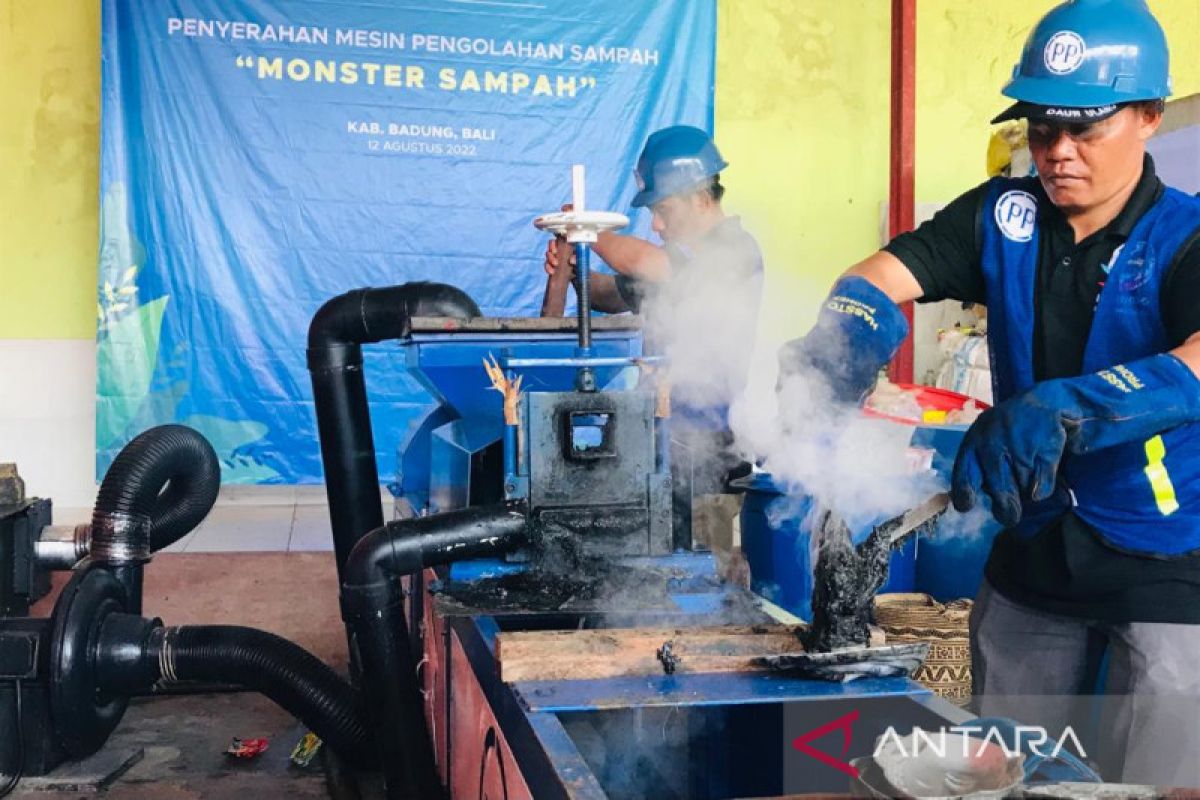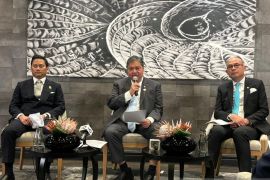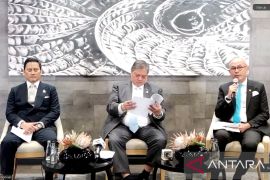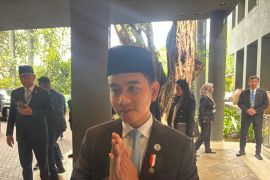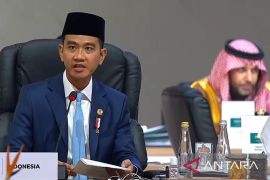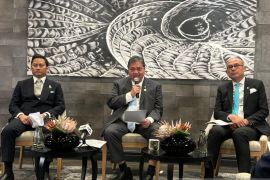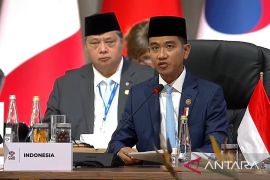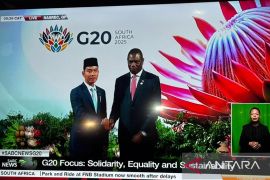Zero waste is a slogan that inspires us. For now, we have a target of producing more waste in larger quantities than nowBadung (ANTARA) - Bali Island will host the 17th G20 Summit on November 15-16, 2022, considered peak of the intensive process of the G20 work meeting, including Ministerial Meetings, Working Groups, and Engagement Groups, during Indonesia’s G20 Presidency.
The G20 is a multilateral cooperation forum comprising 19 major countries and the European Union (EU). The G20 represents more than 60 percent of the world's population, 75 percent of global trade, and 80 percent of the world's gross domestic product (GDP).
To accommodate the international agenda, Bali continues to improve itself, including by managing waste in a better and integrated manner, such as the waste management processing site of reduce, reuse, and recycle (TPS-3R) in Seminyak, Badung District, Bali.
Head of TPS-3R Management of the Seminyak Traditional Village, I Komang Rudhita Hartawan, did not expect that the business he started a few years ago would record rapid growth and effectively contribute to local communities and the development of environmentally friendly tourism.
Hartawan said he occasionally helps workers to unload some plastic bags filled with garbage from the truck for further sorting at TPS-3R Seminyak.
"We live from tourism. Therefore, we do not want our business to be disrupted by the waste problem. Tourism survives because of security and cleanliness," he remarked.
Driven by his love for sustainability of the Island of the Gods' tourism ecosystem, he took a bold step to start and focus on waste management.
Related news: Will complete SPKLUs for G20 Summit by Sep-end: PLN
At the end of December 2003, Hartawan and several members of the Seminyak Traditional Village received training from the government to start the program.
In 2004-2005, the Public Works and Public Housing Ministry (PUPR) extended assistance to TPS-3R’s building, while trucks and other means of transportation were facilitated by the government, and others were owned by the TPS-3R Seminyak Traditional Village.
In 2005, the TPS-3R Seminyak Traditional Village became independent without any subsidies from the government.
TPS-3R has, until now, been able to collect 1,800 customers, with assets totaling 22 transport trucks and three spares. Of these, during the pandemic, only six trucks could be operated and the number of customers decreased by almost one thousand.
Hartawan said that most of the customers of TPS-3R Seminyak were hotels, restaurants, and villas, with household customers reaching 450. Household customers already sort out their waste and then deliver it to TPS-3R twice a month.
Related news: Optimize ISCOS 2022 to support G20 Presidency, realize SDGs: VP
Source-based
Source-based waste processing for the Bali region has a legal basis as stipulated in Bali Governor Regulation (Pergub) Number 47 of 2019 on Source-Based Waste Processing. The regulation was followed up by Governor Decree Number 381/03-P/HK/2021 on Guidelines for Source-Based Waste Management in Villages and Traditional Villages.
The governor's regulation includes rules for managing household waste and other waste similar to household waste. In implementing these regulations, the community plays a key role in changing the paradigm of waste management from a collection-transport-disposal pattern to a sort-of-collection-processing pattern.
The governor's regulation, as quoted from the official website of the Bali Provincial Government, stipulates strategies for Source-Based Waste Management in Villages and Traditional Villages, including the Regulation of Residents, by limiting behavior that produces excess waste, requiring residents to sort waste at the household level, and prohibits residents from throwing garbage into other Villages and Traditional Villages.
The regulation also prohibits residents from disposing waste improperly, limiting the use of single-use plastic materials in accordance with Bali Governor Regulation Number 97 of 2018, to prohibiting residents from throwing garbage in lakes, springs, rivers, and seas in accordance with Bali Governor Regulation Number 24 of 2020 .
According to the Bali Provincial Government's plan for 2022, all traditional villages in Bali have their own waste processing sites. Hence, the regional government plans to close the Suwung Landfill (TPA).
Suwung Landfill in Denpasar, Bali, operational since 1980, spans an area of 32 hectares that could accommodate up to one thousand tons of waste daily from Denpasar and Badung.
Hence, Hartawan and other residents have started to pioneer a waste processing site in the Seminyak Traditional Village.
Waste is a resource that has economic value and can be used, for instance, for compost, energy, building materials, and as industrial raw materials. Meanwhile, rest of the waste, with no economic value, will be disposed.
Waste management at TPS-3R Seminyak Traditional Village is conducted with a comprehensive approach from upstream to downstream. This concept is commonly referred to as the 3R, reduce, reuse, recycle, using a new paradigm of waste management: collection-sorting-process-transport.
For composting the results of processing dry organic waste, the TPS-3R Seminyak Traditional Village will return the waste to the hotel in the form of compost. Meanwhile, the hotel will reimburse the production cost of Rp2,500 per kilogram.
In addition to processing waste, TPS-3R Seminyak Village has several work programs beyond the realm of processing waste, such as an environmental education program where the Seminyak Village TPS-3R team educates students to process waste wisely.
On the other hand, every three months, Non-Governmental Groups from the PUPR Ministry share their experiences in processing waste in tourism areas, including the beach clean-up program running since 2007.
Related news: Bali hotels nearly 100% ready for G20 events: minister
G20 momentum
Although the TPS-3R waste processing technology in the Seminyak Traditional Village still needs improvement, they remain optimistic of achieving their big goal of realizing zero waste according to one of the important agendas in the 2022 G20 international forum.
"Zero waste is a slogan that inspires us. For now, we have a target of producing more waste in larger quantities than now," Hartawan noted.
The TPS-3R has two machines received by the Badung District Government from state-owned enterprises (SOEs) PT PP. The first machine called the garbage monster is a waste sorting machine that can automatically sort organic and inorganic waste.
Meanwhile, the second machine functions as a processor for various wastes, such as plastic, which can be managed to be used as craft materials. This machine is able to process several craft works in the form of blocks, boards, chairs, and tables from processed plastic waste.
The seriousness of the TPS-3R Seminyak Traditional Village in encouraging waste management in the area aligns with the discourse on closing the Suwung TPA before the peak of the G20 Summit next November.
Coordinating Minister for Maritime Affairs and Investment of Indonesia, Luhut Binsar Panjaitan, during his visit on August 31, 2022, emphasized that before the G20 summit, Suwung TPA must be closed immediately.
In its place, the government is developing three construction sites for an integrated waste management site (TPST) in Denpasar that aims to address the waste problem in the general tourism area of Bali. Later, this TPST will become a pilot for 52 other TPSTs in Indonesia.
The three TPSTs will maximally handle waste processing wherein the capacity of the TPST in the Denpasar area reaches 1,020 tons of waste that is divided into three places: 450 tons at Kesiman Kertalangu TPS, 450 tons at the Ngurah Rai Forest Park TPST, and 120 tons at TPST Padangsambian Kaja.
Waste management is important and urgent, as it has become an important agenda for the Indonesian presidency in the G20 under the theme of climate change, in addition to the theme of inclusive health and digital-based transformation.
Related news: G20 should select universal issues for discussion at Bali Summit
The G20 member countries are considered to account for 75 percent of the global energy demand. Hence, they have a big and strategic responsibility to encourage the use of green energy.
In the energy transitions working group (ETWG) side event, for instance, the discussion focused on energy security, access and efficiency, as well as transition to the use of low-carbon energy, including more efficient waste management technology.
Hence, the construction of waste processing sites in Bali is already on the right track and at the right momentum. It takes sound synergy between the government, communities, and society to succeed the G20 big agenda with the slogan "Recover Together, Recover Stronger."
Related news: Preparations for G20 Summit on the right track: Minister Marsudi
Related news: Jakarta expects Bantargebang landfill system spotlighted at G20 Summit
Editor: Fardah Assegaf
Copyright © ANTARA 2022
